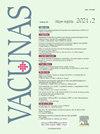Simulation of a novel approach in measles disease dynamics models to predict the impact of vaccinations on eradication and control
Q3 Medicine
引用次数: 0
Abstract
Introduction
Measles, a highly contagious disease caused by Morbillivirus, poses significant public health risks due to its rapid spread and severe complications. Symptoms, such as fever, rashes, red eyes, and coughing, typically appear 8–12 days post-infection. Given recent resurgences, especially in areas with low vaccination coverage, it is essential to understand measles transmission and assess the role of vaccination awareness in outbreak control.
Method
A mathematical model was developed to examine measles transmission and the influence of vaccination awareness. Stability analysis evaluated the model's behavior, while the basic reproductive number, R0, was derived using the next-generation matrix approach. Sensitivity analysis assessed how parameter variations impact outbreaks. Numerical simulations, utilizing the iterative Laplace transform and Atangana-Baleanu fractional derivative operator, explored solution conditions and stability at various fractional orders.
Results
Simulations showed that vaccination awareness significantly reduces measles transmission. Increased awareness lowered R, decreasing outbreak risk. Fractional orders provided insights into disease persistence, highlighting the importance of behavioral factors in control strategies. Sensitivity analysis identified parameters crucial for targeted interventions.
Conclusion
This study underscores the importance of vaccination awareness in controlling measles, showing that education-based strategies can reduce transmission. By integrating behavioral factors in a fractional calculus framework, this research supports efforts against endemic diseases like measles. The findings suggest that awareness campaigns, alongside vaccination, can alter transmission dynamics, offering a novel approach to enhance control measures. This model provides a basis for further research on behavioral interventions in disease modeling.
麻疹疾病动力学模型中预测疫苗接种对根除和控制影响的新方法的模拟
麻疹是一种由麻疹病毒引起的高度传染性疾病,由于其传播迅速和严重并发症,对公众健康构成重大威胁。症状,如发烧、皮疹、红眼和咳嗽,通常在感染后8-12 天出现。鉴于最近麻疹再次出现,特别是在疫苗接种覆盖率低的地区,了解麻疹传播并评估疫苗接种意识在疫情控制中的作用至关重要。方法建立数学模型,考察麻疹传播和疫苗接种意识的影响。稳定性分析评估了模型的行为,而基本繁殖数R0则使用下一代矩阵方法推导。敏感性分析评估了参数变化如何影响疫情。利用迭代拉普拉斯变换和Atangana-Baleanu分数阶导数算子进行数值模拟,探讨了不同分数阶下的解条件和稳定性。结果模拟结果显示,疫苗接种意识显著降低麻疹传播。提高意识,降低R,降低爆发风险。分数顺序提供了对疾病持续性的见解,突出了行为因素在控制策略中的重要性。敏感性分析确定了有针对性干预措施的关键参数。结论本研究强调了疫苗接种意识在控制麻疹中的重要性,表明以教育为基础的策略可以减少传播。通过在分数阶微积分框架中整合行为因素,这项研究支持了针对麻疹等地方病的努力。这些发现表明,提高认识运动和疫苗接种可以改变传播动态,为加强控制措施提供了一种新方法。该模型为进一步研究疾病建模中的行为干预提供了基础。
本文章由计算机程序翻译,如有差异,请以英文原文为准。
求助全文
约1分钟内获得全文
求助全文
来源期刊

Vacunas
Medicine-Infectious Diseases
CiteScore
3.90
自引率
0.00%
发文量
138
审稿时长
62 days
期刊介绍:
Sin duda una de las mejores publicaciones para conocer los avances en el campo de las vacunaciones preventivas, tanto en el ámbito de la investigación básica como aplicada y en la evaluación de programas de vacunaciones. Su alta calidad y utilidad la ha llevado a estar indexada en los prestigiosos índices IME y SCOPUS.
 求助内容:
求助内容: 应助结果提醒方式:
应助结果提醒方式:


